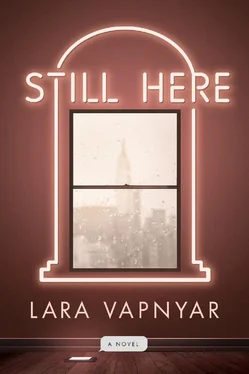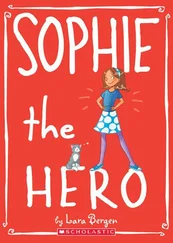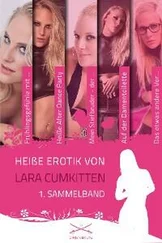“Nastya, come in, sit down,” Aunt Masha said, and this time Nastya came closer and climbed on a smaller stool across the table from Regina. Aunt Masha gave her a piece of bread with butter and cheese, and Nastya took a big bite and started to chew.
She was an unusually homely child, with pale unhealthy skin, a big nose, and mousy hair.
“How old is she?” Regina asked.
“Why are you asking me? Ask her.”
Regina had always hated talking to children. She wasn’t that good at talking to adults either, but it was conversing with children that made her sweat. She could never find the right tone. She did her best to sound neutral, but it came out as either too cheerful or too cross.
“How old are you, Nastya?” she asked. Too cross.
Nastya didn’t say anything. Just stared at Regina intently, making energetic movements with her jaws.
“She knows that she’s not supposed to talk while chewing.”
Nastya made an audible gulp to swallow the bread mass in her mouth and then said that she was five.
“She is five, but she can count to one hundred,” Aunt Masha announced.
“I forget nineteen and forty-seven,” Nastya said and took another bite. There was something about her that made Regina uncomfortable. They made a nice pair, Aunt Masha and Nastya — Baba Yaga and her creepy little helper. Regina had planned to stay with Aunt Masha the whole day before her flight the next night, but now she saw that she wouldn’t be able to stand it. She would stay the night, then go straight to the city center and spend the whole of tomorrow just wandering the streets.
After they cleared the table, Aunt Masha made Regina a bed on the couch in the large living room and took Nastya to the other room that served as their bedroom. It was 10:00 P.M., only 2:00 P.M. New York time. “Do you mind if I watch TV?” Regina asked.
“The TV’s not working,” Aunt Masha said. “It broke a few months ago, and I decided not to fix it. Do you want a book? Come, pick a book.”
“I have a book,” Regina said and settled on the couch with her iPad. She had downloaded several books for her trip, but she found that she couldn’t concentrate on them any better than when she read printed books. It was actually worse. That thing on the bottom of the page that showed the progress of her reading just wouldn’t move past “1 %.” This made it harder to pretend that she was reading and not just staring at the sentences. She lay on scratchy sheets with the iPad propped on her chest, its screen dark, listening to the sounds that came from Aunt Masha’s room. They went to brush their teeth, then each of them peed and flushed the toilet. Then there were soft sounds of Aunt Masha reading a story to Nastya, Nastya’s giggling. It was hard to imagine what Nastya looked like when she giggled. Then it was quiet. Regina turned the iPad back on, but she still couldn’t focus. She made a few futile attempts to find a Wi-Fi signal. She badly needed to watch something. She couldn’t understand why she hadn’t downloaded any movies before she left. Regina got off the couch and walked to the bookshelves hoping to find an easier and more entertaining book. She noticed a framed picture of herself on the wall. She was about fourteen in it. Awkward, unsmiling. That was the age when she did those back exercises. Every day for more than a year. She had a vivid image of herself doing homework with that broom between her elbows. The terrible pain just below her shoulder blades. Biting her lips, willing herself to ignore the pain and focus on her studies. It never occurred to her to question the wisdom of that daily torture. Other kids wore braces. She had perfect teeth, but an imperfect spine — she wore a broom. And what was that nonsense about her dad? Could it be that he really was talented? It had never occurred to her to read any of his stories and judge for herself.
Another train passed by. The whole apartment seemed to shake. This was unbearable.
She heard a soft tapping on the wall of the doorway. There was Aunt Masha in her long white nightgown. Ghostlike in the dark. “Reginochka,” she said, her voice trembling. “Are you asleep?”
“No,” Regina said.
Aunt Masha walked up to her and sat on the edge of the sofa. “Reginochka, please forgive me,” and she started to cry.
Regina sat down next to her, horrified. “No, Aunt Masha, no,” she said, stroking her bony shoulder.
“Reginochka, I’m such a fool. I shouldn’t have said all those things about Olga. It’s just that I felt I had so much to tell you. And I kept rehearsing it all these years. And now you came, but we have so little time to spend together that I had to sort through all those things and pick the important ones. I felt rushed and it came out as cold and awful. I hurt your feelings. Please, please, forgive me!”
Regina nodded.
“You know how much I loved Olga. You must know that!”
“I know,” Regina said.
“Do you?” Aunt Masha asked. “Do you really?”
“Yes, yes, of course I do. She loved you too.”
“She did. I know she did. But she would never admit it. Not as she lay dying. Olga Zhilinskaya — always straight as an arrow.”
Aunt Masha started to sob again and left the room.
Regina went to the bathroom and found some Tazepam on the shelf. She took a pill and went back to the couch. She was out in about five minutes.
She was awakened by a quiet rustling sound. She opened her eyes and saw Nastya sitting at the table with a big children’s book, the sun streaming through the windows. It was hard to tell if she was reading it or just looking at the pictures.
“Good morning,” Regina said. Her head felt unbearably heavy, as if somebody had put a huge sack of potatoes on top of it. That Tazepam was a killer.
“Good morning,” Nastya answered and flipped another page.
“What are you reading?”
“Buratino.”
“Do you like it?”
“I don’t know how to read yet,” Nastya said. “I’m looking at the pictures. There is a boy with a long nose who looks like Pinocchio from the movie.”
Regina was about to explain that Buratino was in fact the Russian version of Pinocchio, shamelessly stolen by Alexey Tolstoy, but decided not to.
“I used to like Buratino too. In fact, it was the first book I read by myself.”
Nastya was unimpressed. Regina wondered if it was more appropriate to leave the child alone or to continue talking to her.
“Bring it over, I’ll read it to you,” she said.
Nastya carefully climbed off the chair, walked to the couch, and sat down in the corner. Regina took the book from her, placed it on her lap, and opened the book to the first page. The inscription in black ink sprang at her: “To Reginochka, on the day when she stops being a Little Puppytail and becomes a schoolgirl.” It was her book! It was the book her mother had given her.
“Oh, my God!” Regina exclaimed.
“Shh!” Nastya said.
Little Puppytail was her pet name all the way through babyhood and preschool.
“This is my book! My mom gave it to me when I was your age,” Regina whispered.
“Masha gave me this book,” Nastya said and started to cry. Regina released her grip on the book, but it was too late.
“Of course, it’s yours now. Of course! It’s just that it used to be mine. But that was a long time ago. Hundreds of years ago.”
Nastya took the book away from her and retreated into the bedroom. There was a long silence, followed by quiet voices, and then puffy-faced, disheveled Masha appeared in the doorway.
“Fighting with a little girl over a book? Seriously, Regina?”
Regina was mortified. “It was a misunderstanding.”
But Masha smiled and said that she was just kidding.
“I’m making farina for breakfast. Do you like farina?”
Читать дальше












